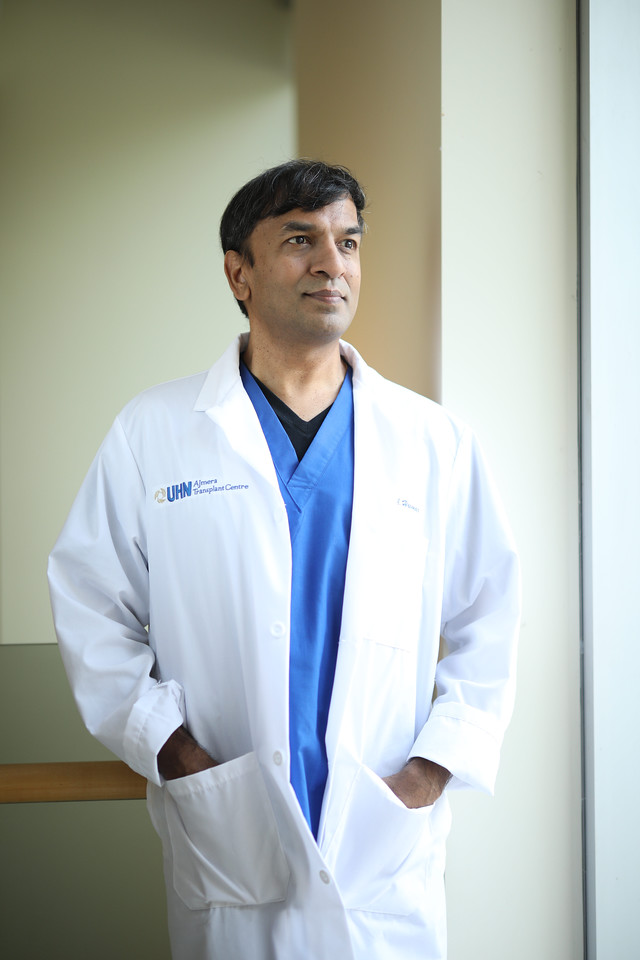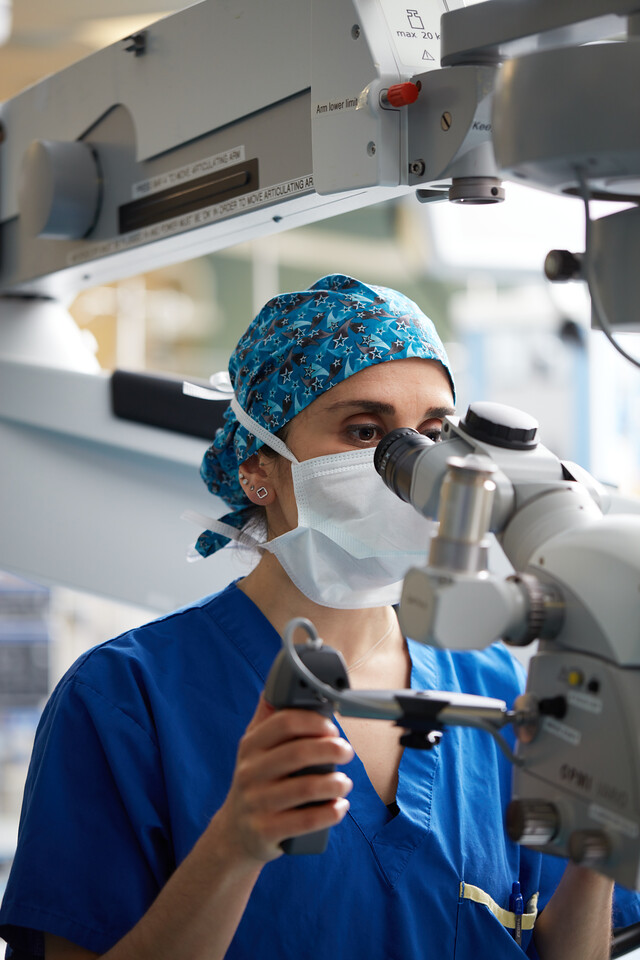Transformative grant will enable ground-breaking innovation using ex vivo technology. Led by Dr. Shaf Keshavjee, the research team is working on sourcing more and better organs for patients in need. (Photo: Tim Fraser)
Researchers at UHN’s Ajmera Transplant Centre and Toronto General Hospital Research Institute have been awarded a transformative grant of $24 million to advance Ex Vivo technology to repair and rebuild organs for all patients in need.
The project, led by the Director of the Toronto Lung Transplant Program and Director of the Latner Thoracic Surgery Research Laboratories, Dr. Shaf Keshavjee, is one of only seven across Canada selected to receive the prestigious Government of Canada New Frontiers in Research Fund (NFRF) – Transformation funding, following a comprehensive international consultation.
“The Ex Vivo Lung Perfusion (EVLP) system we developed here in Toronto has revolutionized lung transplantation in the past decade. Now, it’s been translated around the world and being extended to other organs,” explains Dr. Keshavjee, who is also UHN’s Surgeon-in-Chief in the Sprott Department of Surgery, holds the James Wallace McCutcheon Chair in Surgery, and is Vice Chair for Innovation in the Department of Surgery at University of Toronto.
“With this transformative grant, we now have the opportunity to take Ex Vivo technology to the next level, where we can repair and rebuild organs for transplant.”
Receiving this highly competitive peer-reviewed grant comes after 15 years of impactful philanthropic support from donors to UHN Foundation for the development of Ex Vivo technology, including a founding gift from The Albert and Temmy Latner Family Foundation, which enabled the development and introduction of EVLP into patient care – a world first.
“We owe so much of this program’s success to the belief that our donors have in this work. The lives that will continue to be saved by Ex Vivo technology are a testament to that generosity.” says Dr. Atul Humar, Director of the Ajmera Transplant Centre, R. Fraser Elliott Chair in Transplantation Research, co-Principal Investigator of the project and professor in the Department of Medicine at University of Toronto.
“This philanthropic support will enable us to fully leverage this exceptional grant, driving innovation in the years to come,” Dr. Humar adds.
Support for technology to improve transplant outcomes is much needed. More than 4,500 people in Canada are currently waiting for an organ transplant, and more than 270 die each year as the need for transplant greatly exceeds availability.
Ex Vivo perfusion systems use specialized machines to maintain, evaluate and treat organs before transplant. They significantly increase the number of organs that can be considered for transplant.
With its expertise in this technology, the Toronto Lung Transplant Program has doubled the number of lung transplants performed, and lives saved, at UHN.
“The New Frontiers grant will allow us to advance applications for lungs and further develop Ex Vivo systems for other organs, such as liver, kidney, heart and pancreas,” says Dr. Humar.
Ex vivo perfusion systems use specialized machines to maintain, evaluate and treat organs before transplant. Demonstration seen here with research organs in the lab. (Video: Richard Sanders, OR Media)
Personalized medicine for every organ and beyond
Over the course of this project, the team of more than 20 researchers at UHN and national and international partner sites will develop sophisticated Ex Vivo platforms to:
- Increase organ preservation from hours to days
- Improve the immune response and organ tolerance for transplant recipients
- Advance precision medicine to customize organs to each individual patient’s needs
Longer Ex Vivo preservation prior to transplant will enable a multitude of world-first therapeutic applications, ultimately creating more organs for clinical transplant. One example is to use gene therapy to make an organ more similar to the recipient’s cells and help to address organ rejection by the immune system. Researchers at UHN are also working on changing an organ’s blood type so the sickest people can get access to the next available organ instead of waiting – potentially several months – for one that exactly matches their blood.
Another transformative goal is to use medicines and light therapies in the Ex Vivo circuit to eliminate viral or bacterial infections that previously prevented an organ from being considered for transplant.
“This grant gives us a unique opportunity to extend personalized medicine to every organ group,” says Dr. Marcelo Cypel, Surgical Director of the Ajmera Transplant Centre and thoracic surgeon in the Sprott Department of Surgery.
“It has the potential to change the paradigm in the field of transplantation,” adds Dr. Cypel, who is also co-Principal Investigator of the project and professor in the Department of Surgery at University of Toronto.
This change will include remarkably advanced applications, including the engineering of new organs using stem cells to make organs available for all in need. Significant progress has already been made in generating new kidneys, lungs and tracheae (windpipe), and their applications will be tested further during the six-year project term.
With the involvement of a multi-disciplinary team housed in a world-class centre at UHN, this project will go beyond solid organs.

Dr. Siba Haykal, plastic and reconstructive surgeon in the Sprott Department of Surgery and project co-Principal Investigator will lead research involving vascularized composite allotransplantation — the transplant of limbs, face, trachea and composite tissues, such as skin and muscles.
“These are very delicate tissues that can’t survive outside the body for very long and are very susceptible to rejection,” she explains, adding that the current treatment involves high doses of life-long anti-rejection medication for transplant recipients.
Dr. Haykal and the team want to develop a system to preserve limbs and tissues out of the body without blood flow for longer periods, enabling new cell therapies to “adapt” these tissues to the recipient prior to surgery.
“If we can use techniques that reduce the amount of anti-rejection medication and maybe one day get to a stage where they don’t need it anymore, that would have a huge impact on the patient’s quality of life,” says Dr. Haykal, who is also an assistant professor in the Department of Surgery at University of Toronto.
Dr. Humar adds, “I have seen so many people who have literally been at death’s door and have been completely turned around by transplant and live a full and healthy life. If we can offer that to more patients, then for me that would be an incredible achievement.
“This funding will also help us disseminate our knowledge, and facilitate other hospitals across Canada and around the world build upon what we’re doing at UHN.”

Funding groundbreaking innovation
This funding is designed to support world-leading innovation and enhance Canada’s competitiveness in the global, knowledge-based economy. It will also help the team to refine and improve equitable organ allocation guidelines for all patients.
“UHN is proud to be home for this groundbreaking innovation. The Ajmera Transplant Centre and scientists at the Latner Thoracic Surgery Research Laboratories and Toronto General Hospital Research Institute have changed the landscape of transplantation to benefit patients worldwide. This new funding will enable the team to build on their successes,” says Dr. Brad Wouters, UHN’s Executive Vice President, Science and Research and a professor in the Department of Radiation Oncology at University of Toronto.
“The advancements that this team has made and their continued success made possible by support from provincial and federal governments, industry partners, external charitable agencies, generous philanthropy from the UHN Foundation and our incredible patient partners. This award recognizes the tireless efforts of the team, and this support, which have been key to achieving global impact,” adds Dr. Wouters.
NFRF was designed to support large-scale, Canadian-led interdisciplinary research projects with the potential to realize real and lasting change. It is under the strategic direction of the Canada Research Coordinating Committee and administered by the Tri-agency Institutional Programs Secretariat on behalf of Canada’s three research granting agencies: the Social Sciences and Humanities Research Council, the Canadian Institutes of Health Research and the Natural Sciences and Engineering Research Council.
